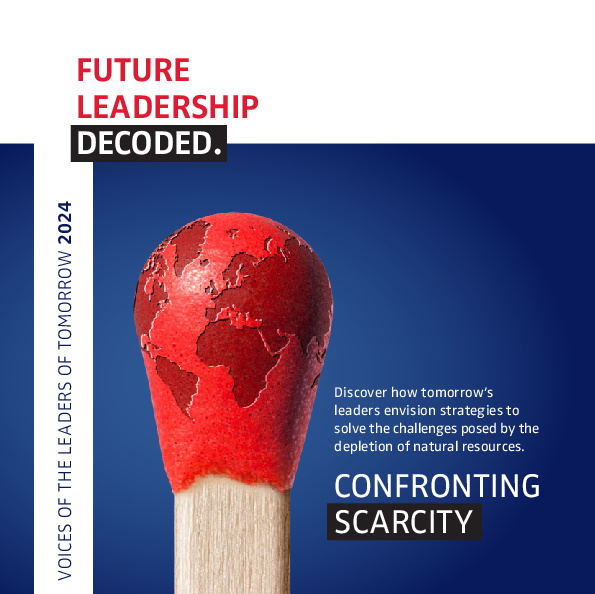Publications
Confronting Scarcity. ”Voices of the Leaders of Tomorrow“ Report 2024
DownloadHesel, N., Buder, F., & Dietrich, H. (2024): Voices of the Leaders of Tomorrow: Confronting Scarcity. Nuremberg Institute for Market Decisions & St. Gallen Symposium
2024
Dr. Fabian Buder,
Holger Dietrich,
St. Gallen Symposium
Confronting Scarcity

At a time when environmental capital and, ultimately, humanity’s natural resources are becoming increasingly scarce, the need for companies to make a positive contribution and adapt and innovate has never been more pressing. Crucially, scarcity extends beyond mere supply chain disruptions; it also represents a critical management issue that requires strategic foresight and transformative action.
How is this scarcity perceived by young talent? What is the attitude of current senior executives? This year's edition of the “Voices of the Leaders of Tomorrow” report provides insights into this. 650 top talents (Leaders of Tomorrow) and 250 top managers (senior executives) from global companies were surveyed in order to shed light on their expectations in dealing with the scarcity of resources and effective strategies for dealing with it. You can download the report [here] for free.
United in disagreement: Consensus on urgency, differences on implementation
The starting point is clear: both generations - Leaders of Tomorrow and senior executives - agree that the scarcity of natural resources is one of the most pressing challenges of our time.
However, there is disagreement on how to prevent a potential collapse of global systems. While senior executives rely on technological progress (87%), only 59% of Leaders of Tomorrow believe that scarcity can be overcome through technology.
While tech is important, we also need to be smart about using resources, like recycling and consuming less. Think of it as a two-pronged attack–innovation plus conservation!
Leader of Tomorrow Mathias Charles Yabe, 24, Social Entrepreneur, CEO at AkoFresh, Ghana
Who bears the responsibility? The decision-makers primarily address politicians and companies
Both the Leaders of Tomorrow and the senior executives point to a major discrepancy between current efforts and the measures required by all market participants. In other words, politicians, companies and consumers are being called upon to do much more than they have so far to solve scarcity problems.
Governments must create the right incentives for businesses. [...] [They] should fund and reward good initiatives and penalize the ‘bad‘ players.
Leader of Tomorrow Basile Narozniak, 30, Senior Client Manager, France
Companies should rethink and reverse their priorities - this is what 88% of Leaders of Tomorrow and 83% of senior executives are calling for. Both generations expect companies to make social and environmental issues a top priority, even if this could slow down economic growth in the short term.
However, when it comes to personal responsibility, future and current leaders disagree: only a third of senior executives call for bonuses to be made more dependent on the achievement of sustainability targets than on economic targets. Twice as many (63 percent) Leaders of Tomorrow would like to see such measures, signaling their willingness to take on more personal responsibility.
Despite recognizing the importance of sustainability, personal accountability may be perceived as a departure from conventional success metrics, posing risks to career advancement. This reluctance underscores the need for systemic changes and cultural shifts within organizations to align personal incentives with sustainability goals.
Leader of Tomorrow Siwon Moo, Startup Founding Team, South Korea
How much responsibility can be transferred to consumers?
The Leaders of Tomorrow and the senior executives believe that consumers also have a responsibility alongside political decision-makers and the economy. They agree that the (correct) behavior of consumers can help to alleviate scarcity problems.
There is no consensus as to whether consumers, for their part, are prepared to take on this responsibility. While the majority of senior executives believe that consumers want to change their consumption behavior and accept higher prices for sustainable products, the Leaders of Tomorrow are not so sure about this.
The perception gap may arise because senior executives have seen consumers‘ growing preference for sustainability, influencing their optimism. However, the Leaders of Tomorrow, possibly more attuned to the economic pressures facing many consumers, may doubt the willingness to pay a premium.
Leader of Tomorrow Assen Plevneliev, 22, Management Consulting, United Kingdom
One thing is certain: The increasing scarcity of natural resources is a global megatrend that will pose major challenges for the economy and society in the foreseeable future. The report's comparison of the perspectives of current and future generations of leaders offers the opportunity to identify common visions and paths for a sustainable future.
The report is a joint publication of the Nuremberg Institute for Market Decisions (NIM) and the St. Gallen Symposium.
NIM-Workshop at the St. Gallen Symposium 2024
Future Leadership Decoded: How Do Businesses Need to Change in an Era of Scarcity?
As part of the St. Gallen Symposium 2024, NIM hosted the workshop session “FUTURE LEADERSHIP DECODED: How Do Businesses Need to Change in an Era of Scarcity?”. Based on insight of the Voices of the Leaders of Tomorrow Report 2024 "Confronting Scarcity", the NIM workshop session aimed to harness diverse generational insights, identify differences and common ground to foster solutions. This interactive session sought not only to understand varying viewpoints but also to collaboratively outline actionable paths forward for truly sustainable business practices.
Authors
- Nina Hesel, Senior Researcher, NIM, nina.hesel@nim.org
- Dr. Fabian Buder, Head of Future & Trends, NIM, fabian.buder@nim.org
- Holger Dietrich, Senior Researcher, NIM, holger.dietrich@nim.org
- St. Gallen Symposium
Contact
